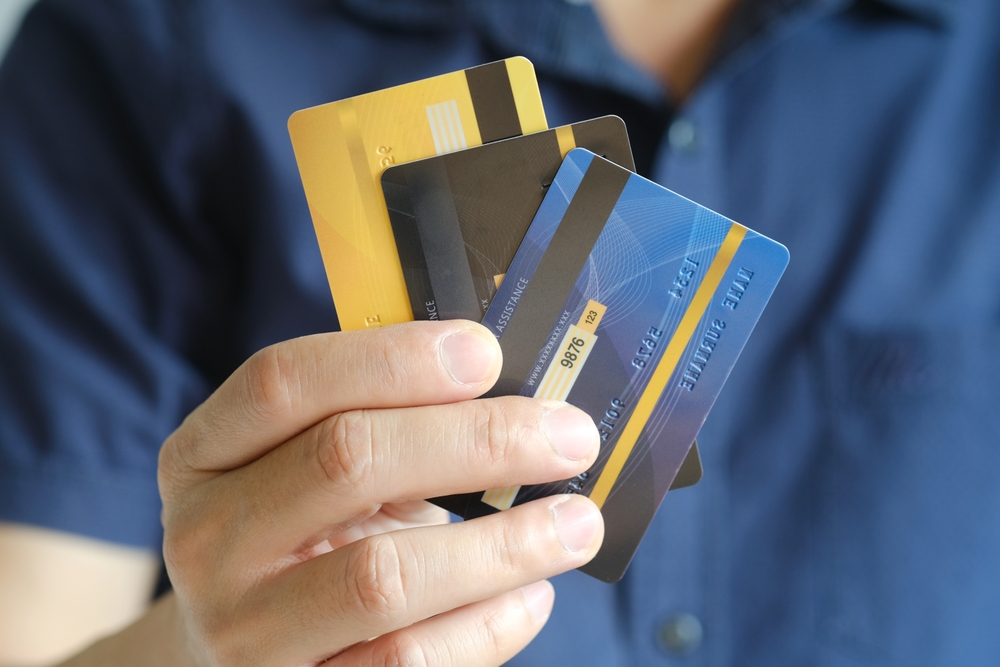You are now leaving the Bright website and entering a third-party website. Bright has no control over the content, products, or services offered, nor the security or privacy of information transmitted to others via their website. We recommend that you review the privacy policy of the site you are entering. Bright does not guarantee or endorse the products, information, or recommendations provided on any third-party website.
Credit Cards are powerful financial tools that can be incredibly convenient when used responsibly. They offer you the flexibility to make purchases, build your Credit Score, and even earn rewards. However, many often wonder whether it's wise to max out their Credit Cards and then attempt to pay off the balance.
This comprehensive guide will explore the concept of maxing out a Credit Card, its implications on your financial health, and strategies for responsibly managing your Credit Card Debt.
Read more: 3 reasons to use personal loans to pay off Debt
Can you max out your Credit Card and pay it off?
Absolutely, while it's possible to max out your Credit Card and subsequently pay off the balance, it's generally ill-advised. Maxing out your card can lead to a high Credit Utilization Ratio, which may negatively impact your Credit Score. Responsible credit management entails keeping credit utilization below 30%, paying your balance in full by or before the due date, and not maxing out all your cards if you have multiple. It's best to maintain a low balance or none at all to avoid excessive interest charges and maintain a healthy credit profile.
Understanding Credit Cards
Credit Cards are like financial magic wands. They allow you to buy stuff even when your wallet is feeling light. But, be careful – they come with a twist. When you use a Credit Card, you're essentially borrowing money from a bank. It's not free cash; you have to pay it back, usually with interest.
The way you handle your Credit Card can make or break your financial game. Paying bills on time, in full, can boost your Credit Score and give you perks like cash back or travel rewards. But if you're not careful and carry a balance, those interest charges can put you in a financial pickle. So, use that plastic wisely![1]
Start Now and Experience the Benefits of Bright Money – Join Us!
Why are people tempted to max out their Credit Cards?

Maxing out a Credit Card can be tempting, especially when you're faced with a significant purchase or financial emergency. The allure of having access to funds beyond your immediate financial means can be strong. Some reasons people might consider maxing out their Credit Cards include:
- Covering unexpected medical expenses
- Making large purchases like appliances or electronics
- Funding a vacation or special event
- Addressing emergency home repairs[2]
Read More: When should you use a credit counselor?
What are the risks of maxing out your Credit Card?
While maxing out a Credit Card might seem like a quick solution to financial challenges, it comes with significant risks and drawbacks:
- High-interest charges: When you carry a high balance on your Credit Card, you'll be subject to high-interest charges, which can quickly accumulate and become difficult to manage
- Impact on Credit Score: Maxing out your Credit Card can negatively impact your Credit Score, which can affect your ability to secure future loans or credit
- Minimum payments: Paying only the minimum required amount can lead to a cycle of Debt, as it may take years to pay off the balance and cost you significantly more in interest
- Stress and financial strain: Carrying a maxed-out Credit Card balance can lead to stress and financial strain, impacting your overall well-being[2]
How does maxing out a Credit Card affect your Credit Score?
Your Credit Utilization Ratio should ideally be kept below 30% to maintain a positive impact on your Credit Score. High utilization rates can signal to lenders that you may be overextended and at higher risk of default.[3]
For more information on credit utilization and how it affects your Credit Score, you can read our blog post How long after paying off a Debt does my credit improve?.
Credit Scores are calculated based on several factors, including:
- Payment history: Timely payments on credit accounts
- Credit utilization: The percentage of available credit being used
- Length of credit history: The average age of your credit accounts
- Types of credit: The mix of credit accounts (Credit Cards, loans, etc.)
- New credit inquiries: Recent applications for credit[3]
Maxing out your Credit Card can have a negative impact on your Credit Score, primarily through the credit utilization factor. When your Credit Utilization Ratio is high, it signals to lenders that you may be overextended financially, which can result in a lower Credit Score.
A lower Credit Score can make it more challenging to secure new credit accounts or loans, and if you are approved, you may be offered less favorable terms, such as higher interest rates.[3]
Join Our Thriving Community – Sign Up and Seek Expert Guidance and Assistance from Bright Money Today!
How to pay off a Maxed-Out Credit Card?
Paying off a maxed-out Credit Card can be challenging, but it's crucial to address it strategically to avoid costly interest charges and Credit Score damage. Here are two specific approaches to consider:
- Pay the Full Balance: Whenever possible, aim to pay off the entire outstanding balance on your maxed-out Credit Card. Credit Cards often have high-interest rates, and carrying a balance can lead to substantial interest charges over time. Prioritize making larger payments until the balance is completely paid off
- Debt Consolidation: Consider exploring Debt Consolidation options, such as a Debt Consolidation loan with Bright Money. This can be an effective way to simplify your Debt repayment efforts and potentially reduce your overall interest costs. With a Debt Consolidation loan, you can combine your high-interest Credit Card Debts into a single, more manageable loan with a lower interest rate
Both of these strategies can help you regain control of your finances and work towards paying off a maxed-out Credit Card more efficiently. To learn more about Debt Consolidation and how it can benefit you, visit our Bright Money page.[4]
Your Path to Financial Wellness Begins Here – Sign Up for Bright Money!
The importance of responsible Credit Card usage
Responsible Credit Card use goes beyond just not maxing out your cards. It's about creating a budget, paying your bills on time, and only using your card for what you can pay off each month. Remember, those interest rates can be a real wallet-drainer, so try to pay your balance in full whenever possible.
If you see 0% APR offers, they can be a temporary lifeline to avoid interest charges. And don't be shy about asking your Credit Card company for a lower interest rate if you have a solid payment history. These habits build a strong credit history, opening doors to better financial opportunities down the road.[5]
Begin Your Journey to Financial Prosperity – Sign Up with Bright Money Today!
Tips for managing your Credit Card wisely
Managing your Credit Cards wisely is crucial for financial health. Focus on the vital 20% to yield 80% of results: create a budget, pay bills promptly, and keep Credit Card balances low. Use tools like Bright Plan to consolidate all your cards, bills, and savings in one place for easy management. This helps you avoid missed payments, reduce Debt, and track expenses efficiently.
By following these tips and leveraging smart tools, you can take control of your finances, improve your Credit Score, and pave the way for a more secure financial future.[6]
Read more: Closing a Credit Card? When Should You Do?
Conclusion
Maxing out your Credit Card and then attempting to pay it off can be a risky financial strategy. While paying off a maxed-out Credit Card is possible, it often comes with adverse consequences such as high-interest charges, damage to your Credit Score, and financial stress. It is crucial to approach Credit Card usage responsibly, which includes not maxing out your cards and paying balances in full whenever possible.
By understanding the fundamentals of Credit Cards, managing your Credit Card Debt wisely, and developing good financial habits, you can harness the benefits of Credit Cards while avoiding the pitfalls associated with maxing out your cards. Remember that responsible financial management builds financial stability and a strong credit history over time.
Empower Your Financial Future – Enroll with Bright Money Now and Get Started!
References:
- https://www.investopedia.com/terms/c/creditcard.asp
- https://www.cnbc.com/select/what-to-do-when-you-max-out-credit-card/#:~:text=Maxing%20out%20your%20credit%20card,cost%20you%20significantly%20in%20interest.
- https://money.usnews.com/credit-cards/articles/what-is-a-maxed-out-credit-card
- https://www.nerdwallet.com/article/credit-cards/maxed-out-credit-card
- https://www.capitalone.com/learn-grow/money-management/tips-using-credit-responsibly/#:~:text=Learning%20how%20to%20use%20a,your%20account%20in%20good%20standing.
FAQs
Q. Is it okay to carry a Credit Card balance occasionally?
Occasionally carrying a Credit Card balance is generally acceptable, but it comes with some financial considerations. When you carry a balance, you'll incur interest charges, potentially making your purchases more expensive. To minimize these costs, aim to pay off your balance in full whenever possible. If you must carry a balance, prioritize paying it down as quickly as possible to reduce interest costs and avoid potential negative impacts on your Credit Score.
Q. What is a Credit Utilization Ratio, and why does it matter?
Your Credit Utilization Ratio is the percentage of your available credit that you're currently using. It plays a significant role in determining your Credit Score. A lower ratio is generally better for your Credit Score, as it signals responsible credit usage. To maintain a healthy ratio, try to keep your Credit Card balances well below your credit limits. A high Credit Utilization Ratio can negatively affect your Credit Score, making it harder to qualify for loans or obtain favorable interest rates.
Q. Should I cancel my unused Credit Cards?
Canceling unused Credit Cards can impact your Credit Score, as it may shorten your credit history and increase your overall Credit Utilization Ratio. Instead of canceling, consider keeping these cards open and using them occasionally for small purchases. This can help maintain a longer credit history and lower your Credit Utilization Ratio, which can positively influence your Credit Score.
Q. What are the pros and cons of balance transfer offers?
Balance transfer offers can be valuable for consolidating and paying off high-interest Credit Card Debt. The pros include potentially lower interest rates, simplified payments, and the ability to save money on interest charges. However, the cons may include balance transfer fees, introductory period limitations, and the temptation to accumulate more Debt. Evaluate the terms carefully and have a plan for paying off the balance within the promotional period.
Q. How do I rebuild my credit after maxing out a Credit Card?
Rebuilding your credit after maxing out a Credit Card involves several steps. First, create a realistic budget and repayment plan to reduce your Credit Card balance. Make consistent, on-time payments, and avoid maxing out other cards. Over time, as you pay down your Debt and maintain responsible credit usage, your Credit Score should gradually improve. Additionally, consider obtaining a secured Credit Card or becoming an authorized user on someone else's account to establish a positive credit history if necessary. Patience and discipline are key to rebuilding your credit after financial setbacks.



